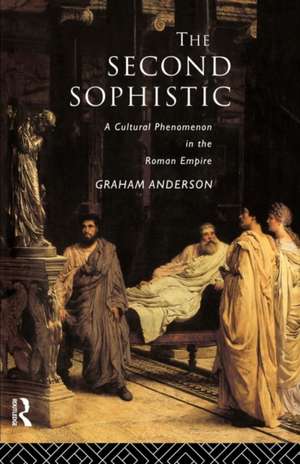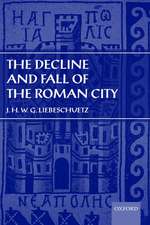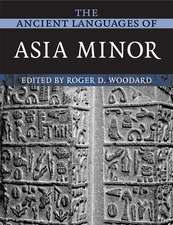The Second Sophistic: A Cultural Phenomenon in the Roman Empire
Autor Graham Andersonen Limba Engleză Paperback – 17 dec 2009
| Toate formatele și edițiile | Preț | Express |
|---|---|---|
| Paperback (1) | 347.64 lei 43-57 zile | |
| Taylor & Francis – 17 dec 2009 | 347.64 lei 43-57 zile | |
| Hardback (1) | 696.55 lei 43-57 zile | |
| Taylor & Francis – 16 sep 1993 | 696.55 lei 43-57 zile |
Preț: 347.64 lei
Nou
Puncte Express: 521
Preț estimativ în valută:
66.54€ • 72.30$ • 55.93£
66.54€ • 72.30$ • 55.93£
Carte tipărită la comandă
Livrare economică 21 aprilie-05 mai
Preluare comenzi: 021 569.72.76
Specificații
ISBN-13: 9780415555012
ISBN-10: 0415555019
Pagini: 320
Dimensiuni: 138 x 216 x 18 mm
Greutate: 0.41 kg
Ediția:1
Editura: Taylor & Francis
Colecția Routledge
Locul publicării:Oxford, United Kingdom
ISBN-10: 0415555019
Pagini: 320
Dimensiuni: 138 x 216 x 18 mm
Greutate: 0.41 kg
Ediția:1
Editura: Taylor & Francis
Colecția Routledge
Locul publicării:Oxford, United Kingdom
Recenzii
`A.s new book will surely become a staple of reading lists, ...' - Classical Review
Cuprins
Preface Abbreviations Introduction: Roman Empire and Greek Renaissance 1. Sophists in Society 2. Preparation, Prologue, Performance 3. Communing with the Classics 4. Atticism and Antagonism 5. Hellenic Past, Graeco-Roman Present 6. Cookery and Confection: Sophistic Philosophy, Philosophic Sophistry 7. Some Sophistic Scene-painting 8. Logos Erotikos: The Sophist as Storyteller 9. Adoxa paradoxa: The Papaideumenos at play 10. Piety and Paideia: The Sophist and his Gods 11. Sophistic Self-Presentation: Some Studies 12. Conclusion: Values and Valuations Select Bibliography Index
Descriere
Presenting the sophists' role as civic celebrities side-by-side with their roles as transmitters of Hellenic culture, Anderson produces a valuable and lucid account of the Second Sophistic.


























